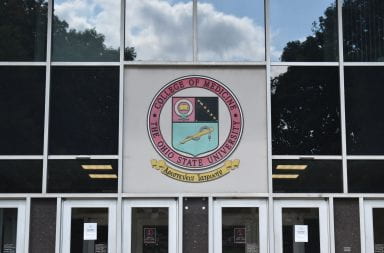
A set of 3D printed skulls, made for the Department of Anthropology in collaboration with the Department of Art, on display outside of Smith Lab. Credit: Courtesy of APOP
The Anthropology Public Outreach Program started from a reaction.
A few years ago, posters promoting white supremacy appeared on campus, stirring controversy across the university, including the Department of Anthropology.
“We’re all humans and we all understand each other enough that we can understand differences, and we can understand how we are the same at the core of it,” said Kimberly Whitman, an Ohio State alumna with a degree in anthropology.
While trying to find a way to contribute to knowledge while increasing people’s exposure to human diversity, the Department of Anthropology created APOP.
“We don’t want to lecture; we don’t want to tell you what to believe. We want to give you the tools, put it in front of you and let you come to your own conclusions,” Emma Lagan, a third-year Ph.D. student in anthropology, said. “You’re more likely to understand and believe in something if you reach that conclusion yourself.”
As an exercise, the groups present current-day items and asks participants what the items say about the owner and then do the same with items from the past.
APOP uses activities like these to provoke a different way of thinking and usher people in from all different backgrounds to provide a modern context to human history.
With anthropology’s focus on human diversity, it was easy for a lot of people within the department to want to “go out on the street and scream and say how everyone is wrong,” said Mark Hubbe, associate professor of anthropology. “But after that initial reaction boiled down a little bit, we decided we need to think this through.”
Hubbe said he sees the country as binary in nature and there is not a lot of middle ground when it comes to clashing beliefs.
“If we are another binary in this nation, we are just adding to the problem,” Hubbe said. “As anthropologists, we know more about human diversity because we are exposed to more.”
Every Saturday, APOP goes to COSI and allows children and adults to pick up 3D-printed skulls and models of skeletal remains. Program members also visit local Columbus schools and challenge kids to think critically and analytically.
Science has become increasingly specialized over the years, Hubbe said, with terminology and jargon that make it difficult to understand without background knowledge.
One of APOP’s primary goals is to take that language and translate it into something more accessible.
In the end, APOP isn’t trying to create anthropologists, but contribute knowledge and understanding to society.
“Human beings are much more than what we are used to,” Hubbe said. “We are exposed to only a small portion of the culture, of the diversity that exists on our planet.”
The Engaged Scholars logo accompanies stories that feature and examine research and teaching partnerships formed between The Ohio State University and the community (local, state, national and global) for the mutually beneficial exchange of knowledge and resources. These stories spring from a partnership with OSU’s Office of Outreach and Engagement. The Lantern retains sole editorial control over the selection, writing and editing of these stories.



